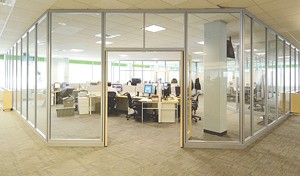Published April 25, 2012 at 10:17 a.m.
Beth Rusnock remembers a time in the not-too-distant past when workers at National Life Group in Montpelier could gauge employees’ status within the company based on the location of their desk, the number of ceiling panels above their cubicle and whether their garbage can was made of steel, wood or plastic.
But in the last year, the vice president for corporate marketing and communication says, such “entitlements” have disappeared entirely, gone the way of other 20th-century relics such as the rotary phone and electric typewriter. Today, National Life allocates workspace to its employees based on the requirements of their job, not on their title or longevity with the company.
In fact, some of National Life’s 900 employees who work in the big office building overlooking Montpelier don’t even have permanent offices or desks anymore. Instead, they take whatever workstation is available when they arrive each morning and log onto a server that houses all their work files, creating, in effect, a paperless workplace. Those employees keep their personal items in carts they can roll from one workspace to another, from small study areas to medium-size conference rooms to large, informal communal spaces that offer stunning, panoramic views of the Green Mountains.
In fact, some National Life employees don’t even work their entire week in the building at all. They’re now expected to spend 20 percent of their time offsite in a location of their own choosing, be it at home, a coffee shop or picnic table in a park.
These, and other changes, are all part of National Life’s $2.5 million modernization project of its corporate headquarters, which is nearing completion; since July 2011, the company has renovated almost 100,000 square feet of office space. The project is the brainchild of CEO Mehran Assadi, whose goal has been to rebrand both the physical and cultural landscape of Vermont’s largest financial-services company.
The changes afoot at National Life reflect a larger trend, in Vermont and elsewhere, that’s reshaping the 21st-century workplace. In an age when more and more workers do their jobs from remote and often multiple locations, businesses as big as National Life — which reported $1.5 billion in revenue last year — to those as small as the freelance writer or self-employed software developer, are creating innovative solutions to better accommodate their particular work habits, schedules and philosophies.
That’s certainly the case at National Life, which has transformed its workplace to reflect its efforts to project transparency, openness and youthful vitality.
“I think there’s been a misperception over the years of National Life Group as ‘your grandfather’s life insurance company,’” Rusnock explains. “In recent years, we’ve been really innovative with our financial services, but our space didn’t reflect that at all. It was pretty old and tired.”
Indeed. A recent tour of National Life’s headquarters reveals just how much has changed in a year. I’m greeted in the second-floor lobby by Rusnock and Tim Shea, National Life’s vice president for facilities, purchasing and contracting. Shea, who’s overseen much of the building’s internal transformation, is there to explain “how the furniture can help people think differently about the way they work.”
We’re joined by Stephen Frey, architect and owner of Arocordis Design. Frey was hired by National Life to re-create its workplace to, as he puts it, “better reflect the values of the company in three-dimensional form.”
To understand how dramatic the change has been, we enter one of the last remaining sections of the building not yet renovated. It’s a drab, Dilbert-esque cubicle farm with harsh, overhead fluorescent lights and 67-inch-high partitions. Much of the furniture is three decades old and sprawls with mazelike complexity.
“Welcome to the cutting-edge action office of the late 1960s,” jokes Frey. “It’s like a rabbit hole. People used to get lost here.”
From there, we enter a stairwell that bathes us in gentle, ambient music as we climb to the third floor.
Inside, the transformation is dramatic. Gone are the high cubicle walls, replaced by glass walls and lower partitions that allow employees to see and converse with one another. Overhead fluorescents have all been replaced by soft, diffuse, energy-efficient lights. In fact, the entire lighting system is controlled by sensors that self-adjust based on the presence of people and the amount of natural light coming in from outside.
“I’ve heard a number of people comment that they feel healthier in the new space,” Rusnock notes. “Air flow is better, the lighting is better and the views are spectacular.”
Denise Graves, a programmer and analyst who’s been with National Life for 17 years, agrees.
“I like the open concept, and I like being able to see everybody,” she says. “You can find out if someone is available if you just stand up.”
Graves admits that the loss of personal space was “definitely a change. It takes a little longer in the morning to get set up, but once you do, you don’t have all that clutter, which can be a good thing.”
As Frey explains, such changes reflect a fundamental shift from “‘I’ space to ‘we’ space.” In the past, an office like this one was 80 percent workstations and 20 percent meeting areas; today, National Life’s offices are about 40 percent workstations and 60 percent communal areas for meetings, group projects, teleconferences and brainstorming sessions.
“It’s kind of exciting because people are more energized at their work areas. They’re not all alone in a room anymore,” Frey adds. “Literally lowering the walls and opening up the floor helps people move to a more collaborative space.”
Collaborative space is a buzzword also heard at Office Squared, a “professional coworking space” at 106 Main Street in downtown Burlington. Office Squared — O2 for short — provides freelancers, independent businesspeople and telecommuters with an affordable, centrally located spot where they can set up shop, hold business meetings, do presentations and work on projects anytime, day or night.
O2 was founded in November 2009 by Jen Mincar, an IT/web project consultant from Richmond. Several years ago, Mincar had two meetings in Burlington — one in the morning, another in the afternoon. Between meetings, she needed a place to hunker down for a few hours and get some work done. She stopped at a local coffee shop but couldn’t find a table. So she sat outside in her car — in frigid, mid-February weather — to access the coffee shop’s free Wi-Fi.
“I thought, this is ridiculous. I’m a professional!” Mincar recalls. “I’ve got to find another way.”
Mincar briefly considered renting an office downtown but realized she only needed something part time and didn’t want to pay for one alone.
So she came up with the idea of a coworking space, and soon found other freelancers and remote workers like herself who were more “nomadic” in their work habits, carrying their offices with them.
Today, O2 has 32 “members” at two locations — the second is at 77 College Street — who pay based on how much space they occupy and how much time they need, anywhere from $5 for a single drop-in to $300 for 24/7 access. Individual offices are available for as much as six months at a time; conference rooms can be rented, too. All O2 members have access to high-speed internet, as well as a fax machine, printer, kitchen, coffee machine and water cooler.
“What I found over the years is, it’s really all about flexibility and options,” Mincar explains. “People like the ability to work at a desk one day and a conference room the next. Sometimes they want an office, sometimes they don’t.”
On a recent Friday morning, about a half-dozen O2 members are gathered around the central conference table — made from an old solar panel — for an informal get-together known as “Friday morning coffee break.” Held weekly from 10 a.m. till noon, it’s an opportunity for professionals from vastly different backgrounds — filmmakers, web developers, attorneys, social-media gurus — to meet, network and talk shop.
Among them is Mary Catherine Jones, a commercial voice-over expert from Shelburne who started her O2 membership two weeks ago. Jones’ “lite” membership allows her up to four days per month at O2, just enough time to finish projects such as mailings, bookkeeping, research and “other work that requires sustained attention.
“I just thought it would be an interesting way to get out of my home office into a different space,” Jones explains. “It’s not terribly expensive at all, and I get more work done in longer chunks of time.”
Beside her is Nan Patrick, a Mary Kay cosmetics salesperson. Patrick says she used to work out of hotel lobbies and local social clubs but found O2 to be “cool, edgy and current.
“I love the fact that there’s a kitchen,” Patrick adds. “My meetings go from 6:15 to 8:15 [at night], so [clients are] either gobbling something to get to the meeting or they’re starving and not thinking about what we’re talking about. Now I bring food and they love it! Attendance has gone way up since I started meeting at Office Squared.”
O2 isn’t the only coworking space in Vermont. At least two others — one in Rutland and another, called Local 64, in Montpelier — are just getting up and running. Mincar also belongs to a Google coworking group of about 850 similar spaces worldwide, which are organized in a variety of ways. Some, like O2, are for-profit businesses, others are not-for-profits.
For Mincar, it’s less about making money than creating a shared workspace that’s conducive to productivity and creativity. Though more and more Vermonters are becoming workplace “nomads” like herself, she says, “People still crave that water-cooler scenario.”
CORRECTION: The original version of this story mischaracterized the percentage of employees who don’t have permanent desks anymore and work 20 percent of their week offsite. Currently, the effort is still a pilot project in National Life's IT department and has not been implemented company-wide, as erroneously reported originally. Seven Days regrets the error.
More By This Author
Speaking of...
-

Vermont to Open $20 Million Business Flood Relief Fund
Jul 27, 2023 -

Video: Following Seven Days' Paper Trail to Québec
Jun 21, 2023 -

Rochester Grocery Store to Close, Leaving Residents in the Lurch
Apr 24, 2023 -

Video: Saying Goodbye to Burlington’s Penny Cluse Café
Nov 17, 2022 -

Essay: Natalie Miller Riffs on How Her Nightclub Survived the Pandemic
Sep 14, 2022 - More »
Comments
Comments are closed.
From 2014-2020, Seven Days allowed readers to comment on all stories posted on our website. While we've appreciated the suggestions and insights, right now Seven Days is prioritizing our core mission — producing high-quality, responsible local journalism — over moderating online debates between readers.
To criticize, correct or praise our reporting, please send us a letter to the editor or send us a tip. We’ll check it out and report the results.
Online comments may return when we have better tech tools for managing them. Thanks for reading.














































